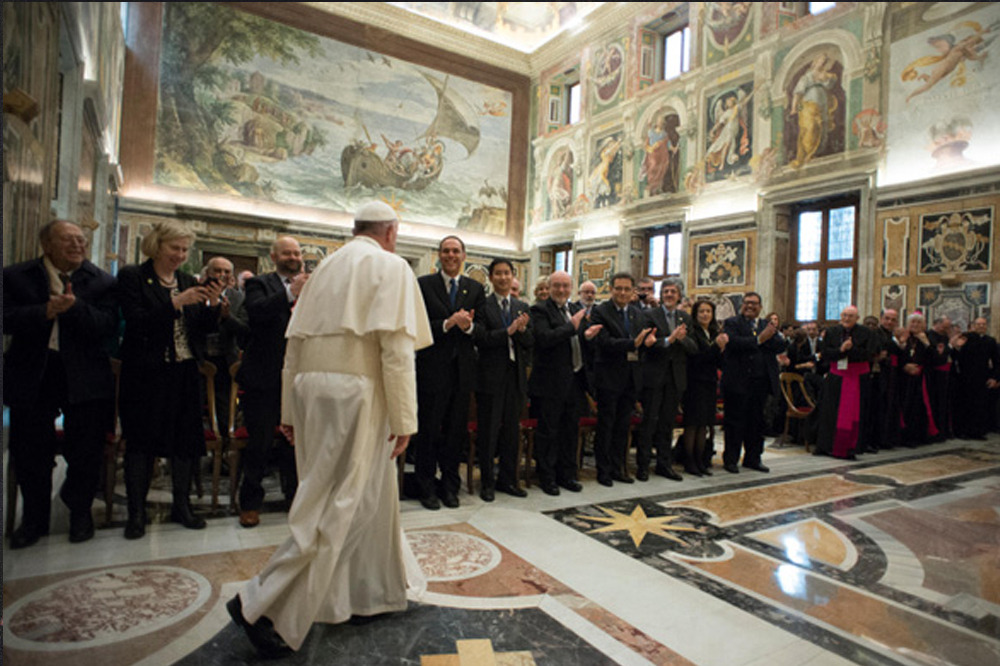In 2015, the Vatican appointed two Loyola Marymount University professors to the Pontifical Academy for Life. Founded in 1994 by Pope John Paul II, the Academy is dedicated to “the promotion and defense of human life, especially regarding bioethics as it regards Christian morality.” Its members consist of experts from a variety of disciplines who deliberate upon and advise the Church on matters of law, moral theology, and bioethics. Dr. Roberto Dell’Oro, Director of the Bioethics Institute, and Dr. Christopher Kaczor, Professor of Philosophy, have now joined its ranks. We asked Professor Dell’Oro to reflect upon his appointment and to share with us what this event means to him, below. To read Dr. Kaczor’s reflections, click here.
ROBERTO DELL’ORO ON HIS APPOINTMENT TO THE PONTIFICAL ACADEMY FOR LIFE
I was happy with the appointment to the Pontifical Academy for Life, and am grateful for the opportunity to serve on an international body of scholars committed to supporting the church in the articulation of its doctrinal position on so called “life issues,” which define the vast and difficult field of bioethics. There is the obvious thrill that goes with being part of a prestigious institution, of course. But there is also a sense of responsibility toward the church and its specific task: to articulate the good news of the gospel with all its ethical implications vis a vis the challenges of the day, striking a difficult balance between faithfulness to the origin, to the core of the ethical message of Christianity, and the complexities of the new questions that affect the life of people and keep their perplexity alive. No one, not even the church, has a ready-made answer to every ethical issue!
I hope for my contribution to the Academy to be predicated, first, on a renewed disposition to listen: to the rich anthropological dimensions, whether theological or philosophical, that inform the church’s doctrine. Brilliant ethical theories might come too late, when our humanity has already lost its soul. A deeper analysis of our human condition is needed. The church invites scholars and the public at large to think of a “richer bioethics,” for what is at stake in the “life issues” are deeper questions of meaning, concerning the place of science and technology in a democratic society, the dignity of the human person, and the wellbeing of our ecosystem. Such questions are, in a way, “beyond good and evil,” in that they define a space of mindfulness, an “ultimate reservation of the spirit” in which we ask, over and over again, what it really means to be human. We might say, with Nietzsche, that the basic ethical imperative is to “remain faithful to the earth.” And yet, what if even this cry, to be most profoundly human, had become, on account of our technological power, an empty wish?
When it comes to the articulation of its moral doctrine, I think the main challenge for the church is seeking to strike a balance between the extremes of a univocal foundationalism, on the one hand, and an equivocal relativism, on the other. The former is the attempt to reduce the practical, and therefore dynamic, quality of ethical questions to an abstract notion of the good, grounded in an essentialist understanding of human nature. The other extreme is offered by a denial of any anthropological constancy that might provide a basis for ethical judgment. Is it possible to find a different “middle” in the grounding of moral norms? How can such an ethical “middle” be retrieved? Will it not look like a kind of “probing” of experience, mindful of the interpretive nature of ethical thinking? If so, the task of the church in the area of moral doctrine seems inevitably twofold: on the one hand, to maintain the ethical tradition alive, safeguarding reached standards of moral performance and insight, whose erosion would bring about the danger of individual and societal self-destruction; on the other, as feminist theorists suggest, to keep alive the tradition’s emancipatory and progressive function, pushing it forward toward the articulation of new paradigms for action.
This is why I see as one of the central concerns of the Academy to articulate the public relevance of moral insights grounded in the Christian revelation. A contribution to the universality of moral experience presupposes faith’s ability to publicly mediate its vision of the good. It is a vision grounded in the experience of transcendence and the epiphany of an absolute good in the midst of history. For the Christian, the good is given as an offer of love, which opens up a dedication to all others, a service to the fundamental goodness of being and to the dignity of the person as intrinsically valuable, never reducible to a disposable object. Of course, the public realm, as we know all too well, is not an ideal community of discourse, a kind of Kantian kingdom of ends. It is historically determined, subject to mechanisms of reduction and alienation. In a situation where technology and the market forces have so great a role in molding and transforming our intuitions, feelings, and visions of the good for human beings, even reasons and arguments can become merely technical, reflecting strategies for the achievement of goals whose value is measured by an instrumental rather than a specifically moral criterion.
I see the contribution of the church like a thorn in the flesh of public moral convictions, the source of an unrelenting hermeneutic of suspicion inspired by prophetic courage. With its academic institutions, including the Academy for Life, the church calls public discussion on moral questions to the suspension of preconceived judgments and dogmatisms of any kind, opening our eyes to a deeper vision of what is good for us as humans.
To read Dr. Kaczor’s reflections on his appointment, click here.
